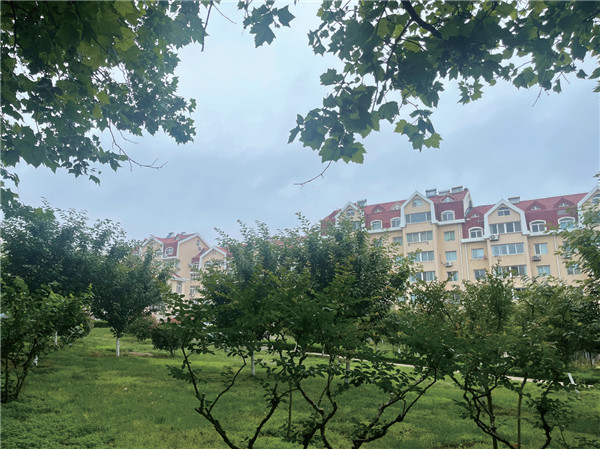中国人的家国情怀
[韩国] 金世友 青岛大学

“家是最小国,国是千万家。”成龙演唱的《国家》用最朴实的歌词道出了对国与家深厚的情感。中国人的家国情怀似乎是沿着历史的长河一脉相承下来的,从杜甫的“国破山河在,城春草木深”“烽火连三月,家书抵万金”到周总理的“为中华之崛起而读书”。从杜甫的热爱祖国、眷念家人的情怀到周总理的博大胸襟和远大志向,无不体现了中国人刻在骨子里的家国情怀。
2020年初,一场突如其来的疫情打破了我们原本平静的生活,也从侧面让我体会到了中国人的民族团结及“舍小家,为大家”的精神。为了人民的生命安全及疫情的管控,中国政府在疫情发生后,马上采取了“封锁”武汉的决策,避免了大规模人口流动导致疫情暴发式增长。原本应该搭载春运回乡旅客的列车上,搭载的却满是来自四面八方的救援物资与前来支援的医疗人员和志愿者。原本应该和家人其乐融融地吃着年夜饭的在外求学的学子及在外务工人员则在自愿隔离中独自一人跨过了一个不平凡的年。
得益于他们为了大家的安全而放弃小家的团圆,中国的疫情得到了有效的控制,并使中国成为有效治理疫情的典范国家。也得益于此,今年的“五一黄金周”的中国国内旅行出游人数竟达到了2.3亿人次,实现了旅游收入1132.3亿元(文化和旅游部数据中心统计)的奇迹。和我一起在中国留学的一对俄罗斯情侣也趁着这次五一假期去了俄罗斯联邦驻广州总领事馆办理了结婚手续,还去了海南度过了为期五天的蜜月。祝福他们!也真羡慕他们!
现如今一些国家依然陷于疫情的水深火热之中,与中国的“国泰民安,山河无恙”形成了十分鲜明的对比。这里并没有嘲笑任何国家或幸灾乐祸的意思,只是中国人能够在鱼与熊掌不可兼得时,以大局为重,遵从政府管理措施,“舍小家,为大家”。中国人的这种家国情怀是值得各国人民学习的。

青岛大学 / 金世友提供
说到家国情怀,不得不提一句我在韩国亚洲大学认识的一位来自湖南省的博士,他虽家境贫寒,但成绩优异,是靠着奖学金一路读到博士的,生活非常简朴但是学习非常努力。我到中国留学后就与他失去了联系,直到一次偶然的机会,我从其他朋友那里得知这位博士已经毕业回到中国了。我以为他会凭借自己的文凭去找一份高薪的工作,改善他的家境与生活水平,但朋友的话令我瞬间对那位博士肃然起敬,朋友说:“他回到了他乡下的老家,成为一名乡村教师。”那位博士常把“为中华之崛起而读书”和“再穷不能穷教育”挂在嘴边,我总是不以为然,以为他只是开玩笑罢了,没想到他真的这么去做了。更没想到从一个普普通通的农村学生身上,我也能体会到中国人刻在骨子里的家国情怀。

参加校园活动(右二为金 世友)
“此生无悔入华夏,来世还做中国人”,这是我在中国的网络媒体上经常看到的一条评论。无论是抖音还是微博,都能看到这样的评论,由衷地表达了中国人对祖国母亲的热爱和身为中国人的自豪。泱泱华夏,巍巍中华,虽历经战乱,饱经沧桑,但华夏人却将华夏魂传承了下来,历经千秋万代却经久不息。
The Familial and National Feelings of Chinese People
[Republic of Korea] Kim Sewoo, Qingdao University
“Home is the smallest country, and country is the family for tens of thousands.” Jackie Chan’s song Country expresses his deep feelings for his country and family through the simplest lyrics. Chinese people’s feelings for home and country seem to have come down in a continuous line along the long river of history, from poet Du Fu’s “On war-torn land streams flow and mountains stand; In vernal town grass and weeds are overgrown”, “The beacon fire has gone higher and higher; Words from household are worth their weight in gold”, to Premier Zhou Enlai’s “study for the rise of China”. Both Du’s love for his motherland and nostalgia for his family and Premier Zhou’s broad-mindedness and lofty ambition reflect the family and national feelings engraved in the bones of Chinese people.
At the beginning of 2020, a sudden epidemic broke the peaceful life, which, however, also made me realize the national unity of the Chinese people and the spirit of “sacrifice the small family for everyone”. For the sake of the safety of people’s lives and the control of the epidemic, the Chinese government adopted the decision of locking down Wuhan immediately after the outbreak, avoiding the explosive growth of the epidemic to be caused by large-scale population mobility. The trains, which had been supposed to carry passengers returning to their hometown during the Spring Festival, were full of relief supplies from all directions and medical personnel and volunteers who came to support. Students and migrant workers who had been supposed to have a happy New Year’s Eve dinner with their families went through an extraordinary year alone in voluntary quarantine.
Thanks to their giving up the reunion of small families for the sake of everyone’s safety, the epidemic in China has been effectively controlled, which has also made China a model country for effective management of the epidemic. Also thanks to this, the number of domestic tourists in China during this year’s May Day “Golden Week” reached 230 million, realizing the miracle of tourism revenue of 113.23 billion yuan (statistics from the data center of the Ministry of Culture and Tourism). A Russian couple who were studying in China with me also took advantage of the May Day holidays to go to the Consulate General of the Russian Federation in Guangzhou to go through the marriage formalities, and they also went to Hainan for a five-day sweet honeymoon. Bless them! I really envy them!
Nowadays, some countries are still trapped in the plight of the epidemic, which is in sharp contrast to China’s “prosperous land and safe people”. I don’t mean to laugh at any country or to gloat over their misfortune. But it is worth learning that the Chinese can put the overall situation first, “sacrifice the small families for everyone”, and comply with the government’s management measures, when the personal interests conflict with the national ones.
When it comes to the feelings for home and country, I have to mention a doctor from Hunan Province whom I got to know at the Asian University in South Korea. Although his family was poor, his grades were excellent and he earned scholarships all the way through doctorate. His life was very simple, but he studied very hard. I had lost all information about him after I went to study in China, until by chance, I learned from other friends that the doctor has graduated and returned to China. I thought he would use his diploma to find a high-paying job to improve his family situation and living standards, but my friend’s words made me respect the doctor instantly. My friend said, “He went back to his hometown in the country and has become a village teacher.” The doctor had often talked about “Study for the rise of China” and “Education is the last thing to sacrifice”. I never took it seriously, thinking he was just joking and never expecting him to do so. Never had I expected that I could also feel the family and national feelings engraved in the bones of the Chinese people in an ordinary rural student.
“I have no regret to be a Chinese in this life, and I still want to be a Chinese in the next life.” This is a comment I often see in China’s online media, whether on TikTok or Weibo. It sincerely expresses Chinese people’s love for the motherland and the pride of being Chinese. Great China, towering China. Despite of wars and vicissitudes, the Chinese people have inherited the Chinese soul, and will pass it on to future generations, without stopping.



